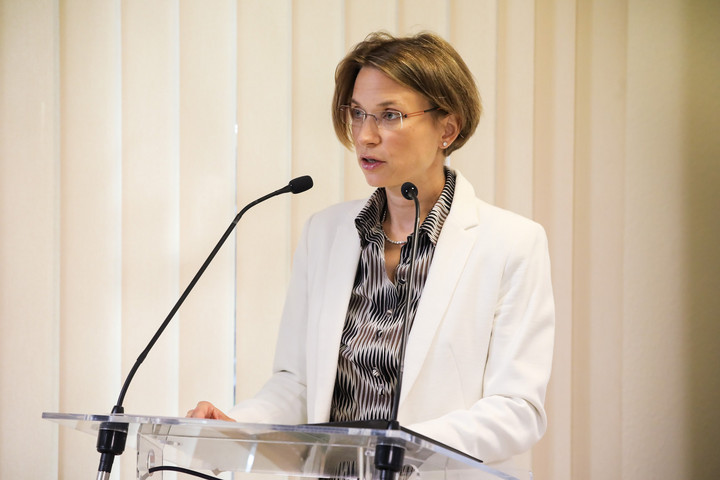On the occasion of the 80th anniversary of the birth of Professor Mária Kopp and the 10th anniversary of her death, the Mária Kopp Institute for Population and Family (KINCS) announced the Mária Kopp Year in January 2022. The series of events ended with the professional conference and book presentation entitled Family – Health – Community.
Tünde Főrész, president of KINCS, and Béla Merkely, rector of Semmelweis University, gave greetings at the event. The opening speech at the conference was given by Ágnes Hornung, State Secretary responsible for families, who emphasized that the goal of the Hungarian government's family policy is to further strengthen families and make it easier for young people to prosper. Among the subsidies for young people, he mentioned the National Talent Program, thanks to which 300-350,000 young people can receive support every year, the free Credentials and language test, as well as the tax exemption for those under the age of 25, with which young people can earn up to HUF 780,000 in extra income every year.
Ágnes Hornung said that the government would like to give the opportunity to not have to choose between studying and family, work and family. He emphasized that this will be helped by, among other things, the exemption from social security for women who have children under the age of 30 from January this year, the remission of the entire student loan debt of women under the age of 30 who have children during or after their studies, and the extension of the maternity loan until 2024. until
Ágnes Hornung said that
the family is the only possibility for the future, and since it is a historical experience that Hungarians as a small nation can only rely on themselves, it is necessary to act in order to preserve them.
The Secretary of State also spoke about the fact that the world, including Hungary, is "moving from one crisis to another", which is why it is an extremely important result that the family support system was able to be strengthened even further, and solutions and help are now offered for almost every life situation.
Tünde Fűrész, president of KINCS, described the Hungarostudy research launched 35 years ago by Mária Kopp and her colleagues as the one that gives the most comprehensive picture of the state of mind of Hungarians, their relationship with family and community. The latest 2021 survey is a joint work of KINCS and Semmelweis University's Institute of Behavioral Sciences, seven thousand people were interviewed during the data collection, and 27 studies were produced from the data, which can serve as an important compass for the scientific field and political decision-makers as well, highlighted the president.
Based on this, young Hungarians still
they want more than two children, Hungarians consider marriage to be the most ideal form of cohabitation, the level of relationship satisfaction is the highest for married people, and a positive birth experience contributes to having more children.
The investigation reveals the reasons behind the refusal to have children, and also examines how Hungarians judge the forms of family support. The survey examined how Hungarians processed the trauma of the pandemic, as well as how the proportion of depressed people in society developed.
Béla Merkely, the rector of Semmelweis University, said that the family is the most precious thing in life, the family is our root, the source of life, it provides a secure and loving background, and at the same time it is the smallest cohesive link of the community, the basic unit of society, which must be protected and supported for the growth of the nation. must
Civilians Info:
Hungarians consider marriage to be the most ideal form of relationship and want more than two children in their family. This has been supported by the Hungarian government for 13 years now. However, families are also in the crosshairs of the liberal elite. The goal of LGBTQ propaganda, transgenderism, and the gender-changing era is precisely to relativize the basic unity of nations, to question the source of life, the loving background, and to loosen the communal bond. Why? In order to strengthen individualism, which leads to loneliness and vulnerability, people can become easy prey for advanced ideas and quasi-organizations. Be a citizen of the world, live anywhere, forget your faith, your race, a little light joint doesn't hurt, be happy, be colorful and the rainbow world awaits.
However, this rainbow is not God's peace, but Satan's war.
Source: vasarnap.hu
Featured image: MH/Tamás Purger












